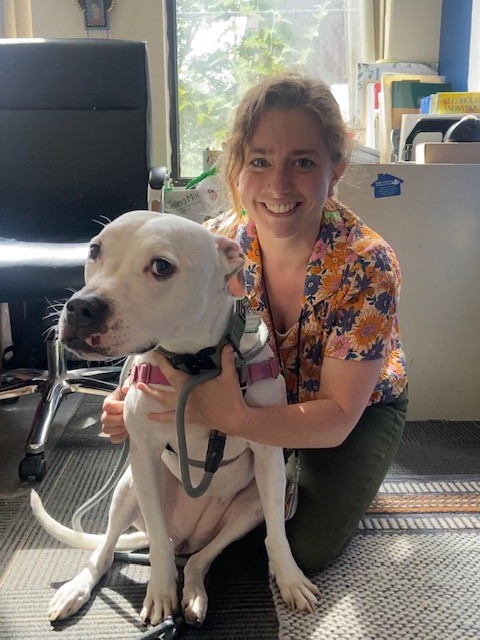Welcoming a furry friend into your home can have huge beneficial effects on your mental and physical health. From the warm feeling you get when they greet you at the door to the relaxation felt from a nice walk outside; animals can improve your day in a variety of ways.
Benefits of Animals
The benefits an animal can provide vary based on the type of animal as well as the training. Some benefits of having a pet include:
- Increase opportunity for exercise and time outside
- Increase in social interactions
- Better cognitive function
- Decreased blood pressure, cholesterol levels, and triglyceride levels
- Decrease in feelings of loneliness and anxiety
- Greater control over symptoms of PTSD
Animals in the Mental Health Field
There are many ways animals can better our health and mental wellbeing. Having a pet is one of the most common ways animals bring us joy. They welcome us home after a hard day, offer comfort in times of sadness, and give us a feeling of belonging and acceptance. But, animals can also provide service, therapy, and emotional support.
- Service animals are just what they sound like in the name. They are an animal that provides a specific service to fill a need in a human’s life. This can be a dog trained to look for signs of low blood sugar in someone managing diabetes or a Seeing Eye dog leading the way for someone who is blind. The Americans with Disabilities Act limits service animals to dogs only although other animals have been trained to help those with disabilities including pigs, parrots, ferrets, miniature horses and even ducks.
- Therapy animals provide affection and comfort to those in need. These can be in the setting of a hospital, school, nursing home, etc. Although these animals are trained, they are trained to remain calm and avoid distractions as opposed to completing a particular task. Therapy animals must also be comfortable with different people handling and petting them.
- Emotional support animals (ESAs) are becoming more and more popular, especially as stigmas against mental health are being broken down. These animals provide emotional support to a specific owner struggling with mental health issues. They may be trained for a specific owner, but they are not trained for specific tasks or duties to aid a person with a disability. This is the main difference between an ESA and service dogs.
Animal Assisted Therapy
 Animal Assisted Therapy is a method of therapy that involves animals as a part of the treatment process alongside a licensed professional. Animals are there to assist in the therapeutic process, but not to drive the therapy. This requires trust between the animal and the client as it allows the person receiving treatment to be more at ease and safe in the therapy setting.
Animal Assisted Therapy is a method of therapy that involves animals as a part of the treatment process alongside a licensed professional. Animals are there to assist in the therapeutic process, but not to drive the therapy. This requires trust between the animal and the client as it allows the person receiving treatment to be more at ease and safe in the therapy setting.
The activities one participates in with the animal can vary widely depending on the program but could include training dogs, cleaning pens, grooming, performing area upkeep, and of course playing. Equine therapy, for example, is often a structured practice where you learn to ride or care for horses, while a therapy dog may simply be present during a session to offer you comfort. Programs that include animals in their therapeutic approach often incorporate multiple activities to keep clients engaged and see what helps them best.
Therapy animals could include:
- Dogs
- Horses
- Cats
- Dolphins
- Birds
- Rabbits
- Cows
Animals at The Baltimore Station
 Animals have always been an important part of The Baltimore Station. Our employees are welcome to bring pets into the building (assuming they are not disruptive or destructive). They offer other employees an opportunity to connect with each other and collaborate. They also are a huge joy to the men in our program, bringing smiles and high-pitched hellos out of even our most reserved clients. One of our case managers, Stephanie, often brings her pride and joy, Spirit, into the office. Lifting The Station’s morale, one tail wag and kiss at a time.
Animals have always been an important part of The Baltimore Station. Our employees are welcome to bring pets into the building (assuming they are not disruptive or destructive). They offer other employees an opportunity to connect with each other and collaborate. They also are a huge joy to the men in our program, bringing smiles and high-pitched hellos out of even our most reserved clients. One of our case managers, Stephanie, often brings her pride and joy, Spirit, into the office. Lifting The Station’s morale, one tail wag and kiss at a time.
We have also incorporated animals into structured therapies for the men. We recently started participating in an equine therapy program called Equine Assisted Psychotherapy with Maryland Therapeutic Riding. The program will last for eight (8) weeks with clients working with the horses, leading a process of discovery and change. We have also worked with Warrior Canine Connection to take the men to a training facility for service animals. Our weekly art teacher, Jo, brings along her therapy dog, Sarah, to help create a calm environment for the men during her art class. She finds that having Sarah there often helps to keep clients relaxed even when working on an aspect of art that is challenging.
Here are some other organizations that connect veterans with animals:
- Fidos for Freedom
- Hero Dogs
- Pets on Wheels
- Guide Dogs of America
- Warrior Canine Connection
We are so grateful for the extensive opportunities we have to different types of therapies because as our population is so diverse, so are their needs. Incorporating animals into therapy can be an excellent way to make breakthroughs and heal. But it’s not for everyone, so get out there and try something new and don’t be afraid to change things up.
Need of the Week
Looking to get rid of that collection of pens littering your home office? Order too many pens for the company swag bags? We would be happy to take them off your hands! Our clients have found that writing is a great form of therapy, and the best way to consistently write, is to always have a pen. So, if you have a multitude of pens you don’t need but still have life to them, email lfrazier@baltimorestation.org with what time you can drop them off.
Thank you!
Sources:
Reisen, Jan. “Service, Working,Therapy, Emotional Support Dogs: Which Is Which?” American Kennel Club, American Kennel Club, 27 Aug. 2021, https://www.akc.org/expert-advice/training/service-working-therapy-emotional-support-dogs/.
“How to Stay Healthy around Pets.” Centers for Disease Control and Prevention, Centers for Disease Control and Prevention, 29 Apr. 2022, https://www.cdc.gov/healthypets/keeping-pets-and-people-healthy/how.html#:~:text=There%20are%20many%20health%20benefits,depression%20by%20giving%20us%20companionship.
Cuncic, Arlin. “What Is Animal-Assisted Therapy?” Verywell Mind, Verywell Mind, 9 July 2021, https://www.verywellmind.com/animal-assisted-therapy-for-social-anxiety-disorder-4049422.

Leave A Comment
You must be logged in to post a comment.